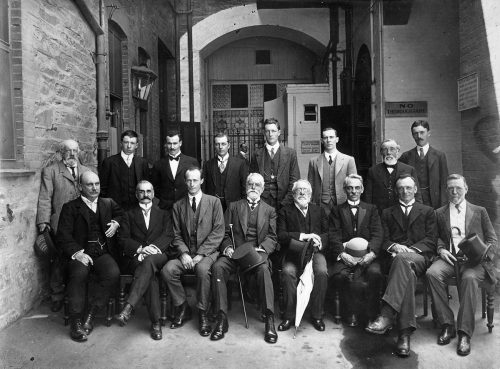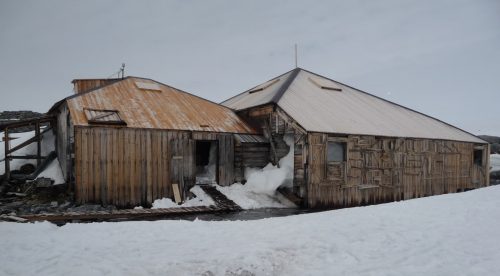Who was Douglas Mawson and why did he go to Antarctica?
“Who is Douglas Mawson”, and “why did he go to Antarctica” are two burning questions that sit on everyone’s lips. It’s up there with the meaning of life and “will Meghan and Kate ever get on?”. Okay, okay, maybe not everyone is fact-checking Sir Doug stats. Still, if you’re considering travelling to Antarctica, you’ll want to know all about Australia’s greatest polar explorer.
We’ll spill the beans on how Douglas Mawson ended up in Antarctica, why there are historically preserved huts in his name.
Read on.
So who exactly was Sir Douglas Mawson?

Sir Douglas Mawson was an Australian geologist, mining engineer, academic, leader, explorer, and survivor who placed Australia firmly on the Antarctic map. Just your everyday Aussie bloke, then! Mawson was a key expedition leader – up there with Roald Amundsen and Ernest Shackleton – during a period dramatically named the Heroic Age of Antarctic Exploration.
While born in 1882 in Yorkshire, England, Mawson moved to Australia as a toddler. Mawson picked up the great Aussie trait of adventure-seeker and was never one to shy from danger. In fact, he was one of the first people to climb Mount Erebus, Antarctica’s second-highest volcano.
With a story as gripping as Amundsen, Scott, and Shackleton’s, Mawson’s 1911-1914 Australasian Antarctic Expedition (AAE) reads like the plot of a Stephen King book, thick with bad luck, disaster, and a touch of horror. Mawson was perilously close to death, yet this plucky Australian’s determination and bravery saw him return home to a hero’s welcome and a knighthood.
Sir Doug passed in 1958, aged 76, and is respectfully credited with being the first to step on the Commonwealth Bay region of Antarctica. As well as for his achievements in securing Australian territory on the continent, and extensive scientific data collated across his three Antarctic expeditions. He was also posthumously recognised as the first person to discover gold in Antarctica.
Why did Douglas Mawson go to Antarctica?
While the landscapes and climate of Australia and Antarctica are polar opposites (groan, dad joke), Mawson discovered a passion for the blustery climes of Antarctica. He first took to the continent in 1907 with Ernest Shackleton. He later declined an invitation to return with Brit explorer Robert Falcon Scott. Mawson wanted Australia to have its own mark on the Antarctic map.
With an impressive ability to raise funds, alongside a desire to advance scientific knowledge, Mawson got the go-ahead for an Australian-led Antarctic research expedition. This 1911-1914 trip gained Mawson recognition, though it came at an enormous price, as we’ll soon reveal.
Despite his near-death experience, face-numbing blizzards, brutal winds, and temps more frigid than that look your partner gives you when you steal a chip, Mawson returned to Antarctica twice. His foresight to make a 42% territorial claim for Australia cemented his reputation as Australia’s greatest polar explorer. Mawson’s tenacity and commitment now afford three science bases and one research lab to continue their ground-breaking exploration of Earth’s southernmost continent.
What did Sir Douglas do in Antarctica?
In 1911, Douglas Mawson and his crew, departed Hobart aboard the Aurora, a wooden sailing ship purchased for the trip. With Mawson as leader of the Australasian Antarctic Expedition, there were high hopes for Australia’s first large scale scientific exploration. Sadly, Mawson was only one of a handful of survivors to make it home. That said, it is still one of the most successful scientific Antarctic expeditions, as it lay the groundwork for Australia’s territorial claims.
The Australasian Antarctic Expedition’s tragedy occurred in 1912, when Douglas Mawson, Belgrave Ninnis, and Xavier Mertz set off with a team of sledge dogs to explore the region. Close to 500 kilometres from their Cape Denison base, a crevasse swallowed Ninnis, six of the strongest dogs, most of the food, and the tour tent.
Mawson and Mertz struggled through the elements back to base over a month, with only ten days’ worth of supplies. Bleak indeed, and Mertz sadly never made it after consuming toxic-to-humans dog liver. Mawson continued back to base in solitude, only to see the relief ship sailing into the distance. This left him with an unexpected additional year in Antarctica’s treacherous conditions. In 1914, when he finally made it back to Hobart, Mawson’s unimaginable story of survival overshadowed the expedition’s scientific gains – at least from a public and media perspective.

What and where are Mawson’s Huts?
If you saw the historic Mawson’s Huts in outback Australia, you’d think it fair dinkum to stay there. The prefabricated Baltic Pine huts look like they’d provide shelter, some level of comfort and a chance of surviving the elements. As blizzards constantly raged, sometimes up to 300kph, Mawson and his men sheltered in these basic huts.
The Mawson’s Hut complex consists of four buildings in Cape Denison, Commonwealth Bay. They are only one of six complexes that survived the Heroic Era of Antarctic exploration, giving them heightened historical significance. Although wind, ice, and time have weakened the Baltic Pine structure, the Mawson’s Hut Foundation manage them for posterity. The Main Hut housed all 18 men in just over seven sqm (75 ft²)!


